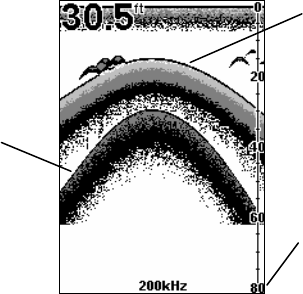
26
To choose the proper location for shoot-thru-hull mounting, follow these
testing procedures: (You may need a helper to complete these steps.)
1. Anchor the boat in about 30 feet of water. Add a little water to the sump
of the boat. Plug the transducer into the sonar unit, turn it on, then
hold the transducer over the side of the boat in the water. Adjust the
sensitivity and range controls until a second bottom echo is seen on the
display. (You'll need to turn off Auto Sensitivity, Auto Depth Range and
ASP™. Try a range setting that is two to three times the water depth.
The harder (more rocky) the bottom, the easier it will be to get a second
bottom signal.) Don't touch the controls once they've been set.
Example of a second bottom signal. Unit is in 30 feet of water, with
range set at 80 feet and sensitivity set at 87 percent.
2. Next, take the transducer out of the water and place it in the water in
the sump of the boat, face down. (The transducer face is shown in the
figure on the following page.) Notice how the signal strength decreases.
The second bottom signal will probably disappear and the bottom sig-
nal intensity will likely decrease.
3. Now move the transducer around to find the best location with the
strongest possible bottom signal. If you find a spot with an acceptable
bottom signal, mark the location and move on to step 4.
If you can't get an acceptable bottom signal, try turning up the sensitiv-
ity by three or five keystrokes and then move the transducer around
once more. If you find a spot that works, mark it and move on to step 4.
If you have to turn up sensitivity by more than five keystrokes to get a
good signal, the transducer should be mounted on the outside of the
hull. This is especially true if you have to turn sensitivity all the way
up to get a decent bottom signal.
Second bottom
True bottom
Manual range setting


















